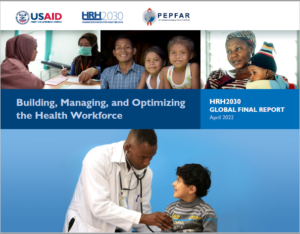24 Aug Building, Managing & Optimizing the Health Workforce: HRH2030 Global Final Report
The Human Resources for Health in 2030 (HRH2030) program is a global, six-year cooperative agreement funded by the United States Agency for International Development (USAID) and the United States President’s Emergency Plan for AIDS Relief (PEPFAR) to help low- and middle-income countries develop the health workforce needed to prevent maternal and child deaths, support the goals of Family Planning 2020 (now 2030), control the HIV/AIDS epidemic, and protect communities from infectious diseases.
HRH2030 worked in more than 30 countries to build health worker competencies, skill mix, productivity and performance, while also supporting local, regional, and national governments to strengthen their leadership and governance capacity to ensure an accessible, available, acceptable, and high-quality, high-performing workforce. Through these efforts, these countries are better able to make progress on their own health objectives and move forward on the path to universal health coverage (UHC). As the program ends after 2021, the Year of Health and Care Workers, may its achievements, highlighted throughout this report, serve as inspiration for all those in the global health community to increase their tangible investments in supporting and protecting the health workforce.
This final report details the program’s achievements, and looks at the road ahead for health system to further strengthen the health workforce and advance universal health coverage, as well as supporting health systems to promote, protect, and maintain health for all people needs a health workforce that is accountable, affordable, accessible, and reliable.
Associated Content
HRH2030 Global Final Report Annexes
Six Years of Building, Managing, and Optimizing Health Workforce
Prioritizing Investments Today to Shape the Health Workforce of the Future
Country: Global
Resource Type: Final Report
Topic: Human Resources for Health
DOWNLOAD






